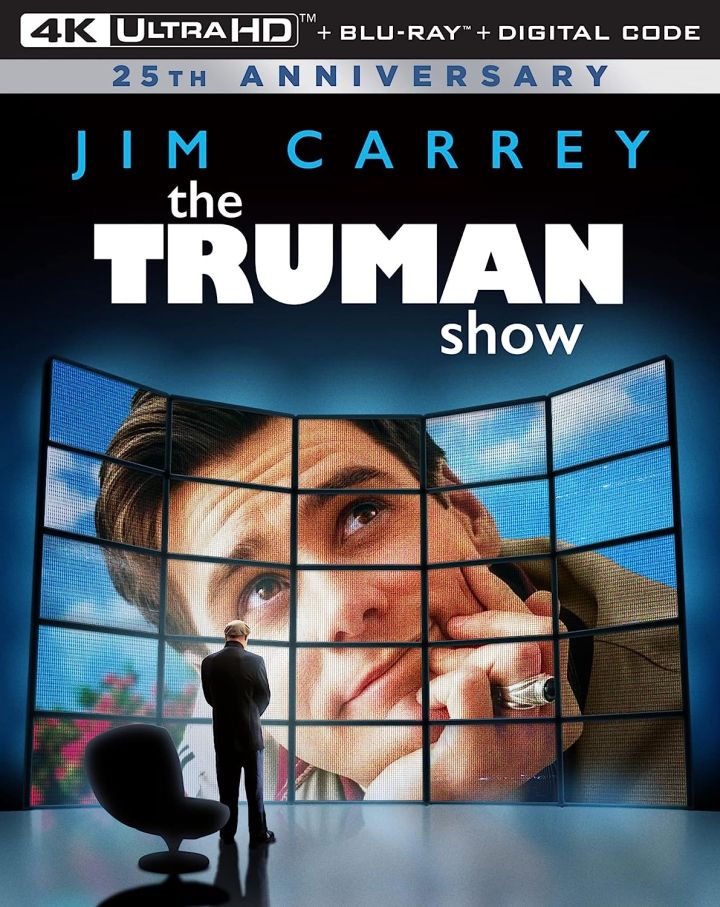
What’s frightening about The Truman Show, a dystopic nightmare about the co-option of human experience and survival in a corporate panopticon, is that it turns out to have been optimistic. It views a human life lived with no privacy, without an unscripted moment, to be horrific. Modern reality has found that people want to do it to themselves.
The Truman Show, directed by the great Peter Weir from a screenplay by Andrew Niccol, came out in 1998 where livestreaming, podcasts, and “influencers” weren’t even hinted at in the zeitgeist. It’s the story of a 24-hour television show which broadcasts, unedited and unadulterated, the life of a human being. The first baby adopted by a corporation; Truman Burbank lives in a world where he is the only one non-cast member. His experiences, including the “death” of his father and his college romance which leads to marriage, have all been contrived.
Played by Jim Carrey in his first major starring dramatic role, Truman Burbank lives his life as a kind of sitcom character. He’s semi-happily married. He has a decent job selling insurance. He has a best friend who is with him through thick and thin.
But strange things happen. His unreality begins to unravel. It starts with a light that falls from the sky, smashing on the road in front of his house. It’s obviously a Klieg light, and labeled as “Sirius”, a star. But on the way to work, the radio reports on an aircraft dropping parts as it came to an emergency landing. Curiosity quelled.
But Truman is a curious guy. He wanted, as a kid, to be an explorer. And, in a rare mistake in his controlled life, he falls in love with an extra. Sylvia (Natasha McElhone who might be the woman with the greatest cheekbones on earth) hides from Truman. She tells him they’re not supposed to interact. But he pursues her, and they take a trip to the beach where she almost tells him the truth. She’s interrupted by her “father”, who says she’s schizo and they’re going to Fiji. So, Truman becomes obsessed with going to Fiji.
But because of his father’s tragic death at sea, Truman becomes terrified of going off the island he lives on. Except that death didn’t happen. It was contrived, his father written out of his life.
The genius of the film is how its point of view shifts as the interest in the narrative shifts. It starts mostly from Truman’s point of view. There’s an unfortunate intro that makes it clear he’s a character in a TV show. It would be nice if this didn’t happen, so we could experience everything from Truman’s point of view from the start, but movies need to be sold and without the premise being upfronted, no one would watch. As Truman begins to suspect his position, the film’s perspective shifts from him to his imprisoners.
Specifically, the show creator Cristof becomes the central character. He’s the TV artiste who has created the Truman show, and he loves Truman… not quite like a son. He loves him like a creation he has devised with his God-like powers. And when that creation rebels, he uses his power to bring him in to line.
The Truman Show operates on several levels at once and does so brilliantly. There’s the personal story of a man learning his life is a lie. There’s the large satirical aspect: the film often moves out of the show’s perspective to the viewers, the lumped proletariat who eats up the show. There’s a Truman Show bar where the show is on constantly and the bar maids’ conjecture about the storylines.
The Truman Show is 25 years old. But it feels more sophisticated than more contemporary films addressing the same questions. I think this is because it comes from a moral universe that doesn’t accept the notion of constant surveillance. This film says, essentially, that one should not be a non-player character in one’s own life. It’s a notion that was almost axiomatic when the movie was made and feels kind of radical today.
The film has so many layers. Take Truman’s wife, Meryl (Laura Linney, who is gorgeous in this film.) She spouts platitudes and spends most of her time engaging in product placement. But then she tells Truman they should work on having kids. She’s part of his simulacrum and obviously sleeping with him as his wife. There’s an obvious ethical quandary there since she’s essentially a corporate prostitute. But when Truman starts to break down and frightens her, she screams to the cameras: “This is unprofessional!”
Andrew Niccol originally wrote the film with a much darker side, and director Peter Weir sought to make it lighter and funnier. But despite the jokes, The Truman Show has a rather grim observation of the panopticon world we live in, which is much more relevant today than when the film was made. Then, the film looked like a dire observation of a terrible possibility. The Truman Show‘s hellscape is the willing reality for many.
The Truman Show‘s pastel-tinged hyper-real small-town aesthetic is beautifully represented on this new 4K transfer. It’s detailed and filmic looking. It’s a fine new release of a film that has become even more timely than when it was released.
The Truman Show has been released on 4K UHD and Blu-ray by Paramount. There are no extras on the 4K disc. Extras on the Blu-ray disc include “How’s it going to end?” (43 min), a making of documentary; Faux Finishing: The Visual Effects of The Truman Show (14 min), about the film’s visual effects; deleted scenes (13 min) and a photo gallery.